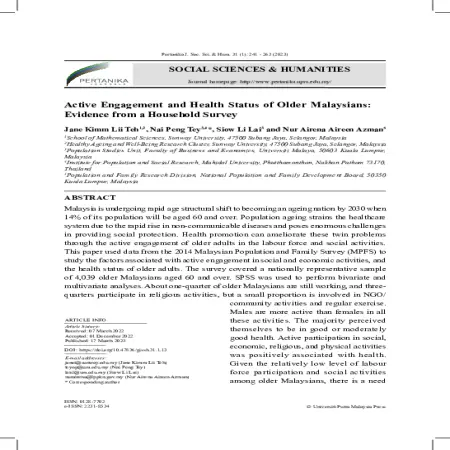Browse by Type
Results for Item type : "Article"
|
|
Active engagement and health status of older Malaysians evidence from a household survey
Item Type: Article
Editor:
Year: 17/03/2023
Abstract: Malaysia is undergoing rapid age structural shift to becoming an ageing nation by 2030 when 14% of its population will be aged 60 and over. Population ageing strains the healthcare system due to the rapid rise in non-communicable diseases and poses enormous challenges in providing social protection.
|
|
|
|
|
|
Konseptual kualiti hidup dalam konteks golongan pesara di Malaysia
Item Type: Article
Editor:
Year: 00/12/2021
Abstract: Quality of life carries a more complex meaning in explaining the context of an individual's life status, whether they are satisfied and happy with their living conditions or not. The phenomenon of quality of life can be measured by looking at indicators in various aspects whether monetary or non-monetary. This study was conducted to examine what the meaning of quality of life is in the context of retirees in Malaysia. In addition, this study was also conducted to see what indicators affect the quality of life, especially for retirees in Malaysia. In order to achieve the objectives of this study, a qualitative method was used, particularly working on reading sources from previous studies. The sources were screened through Scopus access. The main findings of this study found that there are various indicators that affect the quality of life
retirees in Malaysia and can be divided into two categories, namely monetary which consists of economic indicators, and
residence. While non-monetary consists of indicators of social support, health and family life. Therefore, this study will analyze and conceptually describe the quality of life of the retirees in Malaysia in a more comprehensive way through research on national policies and policies, as well as see a brief comparison with other countries.
|
|
|
|
|
|
Impak positif daripada pandemik covid-19 kepada institusi kekeluargaan
Item Type: Article
Editor:
Year: 00/12/2021
Abstract: The world was shocked by the presence of the Covid-19 pandemic which changed the norms of human life from the usual. This effect also
felt by every family institution which is the basic group in a community. The routine in family life that has become a habit had to be changed because of it. Previous studies have found that there are various negative or positive impacts from this epidemic. This article places special emphasis on the positive impact of the Covid-19 pandemic on family institutions. The study is exploratory because it is a new issue with limited resources. The study literature is based on references obtained from reading sources related to the Covid-19 pandemic and the concept of new norms for family institutions. In addition to that, independent observation and experience are also the results of the study. The focus of the positive impact of this pandemic on family institutions is seen from a spiritual perspective, habits and attitudes. The result of this writing found that there are several lessons referring to the positive impact useful to be used as a reference or guide in the future. The concept of understanding and returning to religious teachings is the key to getting a positive impact from any form of calamity or disaster.
|
|
|
|
|
|
Pendekatan kaunseling disermen dalam menangani konflik perkahwinan era pendemik covid-19
Item Type: Article
Editor:
Year: 00/12/2021
Abstract: Marital conflict management in a quality manner is necessary considering the functionality of the husband and wife is the backbone
to marital bliss. In this paper, the use of the 'Pendekatan Kaunseling Disermen' introduced by William J. Doherty is proposed to be used during counseling sessions involving couples where one party tends to stay and the other tends to divorce, especially in the era of the COVID-19 pandemic.
|
|
|
|
|
|
Communication activities between spouses during covid-19 pandemic
Item Type: Article
Editor:
Year: 00/12/2021
Abstract: Interpersonal communication is vital in every relationship. In this current situation of pandemic Covid 19, movement control orders (MCO) have been implemented by the government. Due to the MCO, people spend more time at home and the communication activities within the family might change as well. Thus, this research will conduct a qualitative method (in-depth interviews) to investigate the communication activities and the effects of those activities between spouses during the pandemic of Covid 19.
|
|
|
|
|
|
Academic performance and gender stereotypes among KUPTM students
Item Type: Article
Editor:
Year: 00/12/2021
Abstract: This study was aimed to find the gender differences in stereotypes. This study also seeks to identify the relationship between different levels of academic performance and stereotypes. A quantitative method was applied in this study and data was collected through the distribution of questionnaires among 230 respondents from Kolej University Poly-Tech MARA Kuala Lumpur (KUPTM KL). The result shows that there is no significant relationship between stereotypes and gender.
|
|
|
|
|
|
Impak covid-19 terhadap kelestarian sosioekonomi masyarakat pedalaman di Malaysia: kajian kes Daerah Segamat Johor
Item Type: Article
Editor:
Year: 00/12/2021
Abstract: The implementation of the Movement Control Order (MCO) by the government to control internal and cross-border movement of districts and/or states has been accepted and adapted to become the new norm in controlling the spread of infection, especially involving vulnerable community groups. But at the same time, this restriction of movement also disrupt various activities in the economic sector which is the heart of community life. Since there is a lack of specific research to find out the impact of Covid-19 on the socioeconomic sustainability and needs of the rural community, a case study and field survey was conducted invoving 20 respondents/household heads (KIR) in Felda Pemanis 1, Segamat district, Johor on 13-14 September 2021. The findings show the majority respondents are senior citizens who belong to a vulnerable and high-risk group.
|
|
|
|
|
|
Penghayatan islam dan hubungannya terhadap pengabaian qawwamah dalam perkahwinan
Item Type: Article
Editor:
Year: 00/12/2021
Abstract: Qawwamah in marriage is an issue that is often raised when there is domestic conflict. Neglect of qawwamah by the husband will have very big implications for the wife. The emergence of domestic dysfunction is due to the problem of leadership that is not based on the appreciation of Islam. Harmony and happiness are difficult to form without the implementation of Islamic practices applied in household institutions. This study suggests that the appreciation of Islam be used as a model in fostering household leadership that is free from conflict in creating a harmonious and calm atmosphere.
|
|
|
|
|
|
Program dan aktiviti warga emas satu kajian di pusat aktiviti warga emas (PAWE) Negeri Kedah
Item Type: Article
Editor:
Year: 00/12/2021
Abstract: For the State of Kedah, the aging status based on statistics up to now is 12.6% of the elderly population based on the total population in the State of Kedah of 2.2 million people. In accordance with the wishes of the Federal Government, it is necessary to establish every PAWE in every Parliament to draft and enable the elderly to always be active in the State of Kedah. In the State of Kedah there are 12 PAWEs representing 12 Parliamentary constituencies and this study will look at the involvement of the elderly in activities and programs that successfully attract their interests and tendencies. At the end of the study, the researcher will state the need for such a program as an example among the elderly and be used as a guide in the future.
|
|
|
|
|
|
Knowledge, attitude and practice on female sexual dysfunction (mati putik) among women in Kuantan, Pahang
Item Type: Article
Editor:
Year: 00/12/2021
Abstract: Female sexual dysfunction or also known as ‘mati putik’ can be defined as women with lack of sexual desire, difficulty in arousal, inability to reach orgasm, pain during intercourse, failure to feel pleasure from sex or anxiety about sex performance. In Malaysia, infidelity or sexual relationship was in the top reasons of divorce cases. Hence, this study aimed to determine the level of knowledge, attitude and practice on female sexual dysfunction among female in Kuantan, Pahang. A total sample of 100 married women was randomly selected based on the classification in inclusive and exclusive criteria.
|
|
|
|














